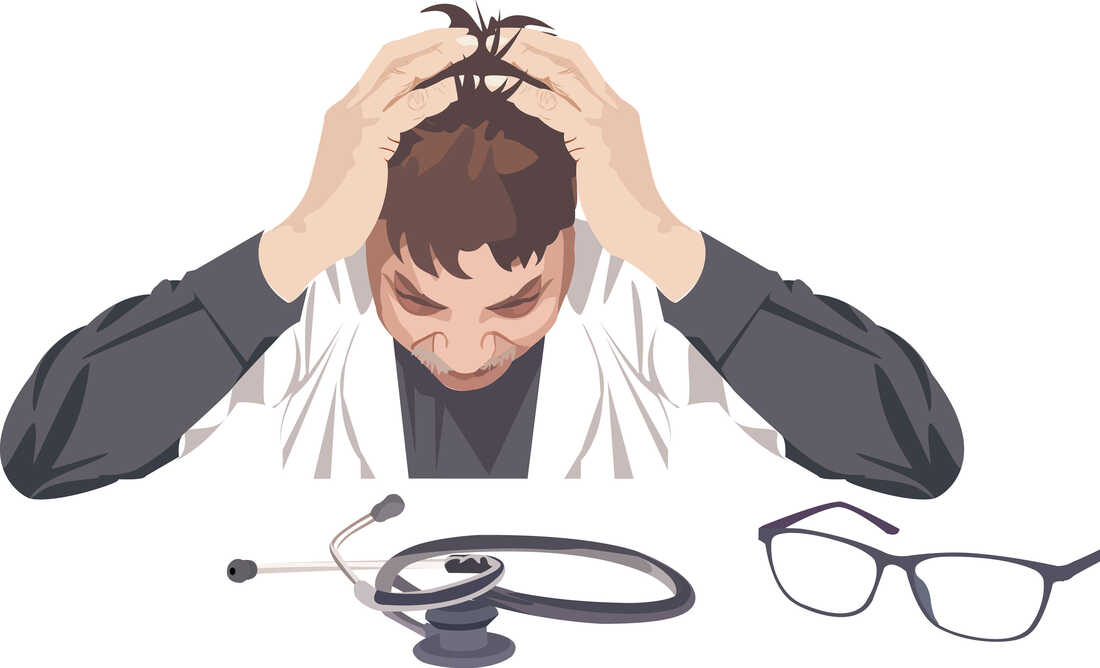
ssnjaytuturkhi/Getty Images
ssnjaytuturkhi/Getty Images
The young man was in his mid-20s when he came to see me for severe abdominal pain at my small community clinic. The pain, worse than any he’d ever experienced, had persisted for weeks and was getting worse. He cried out when I examined him.
I didn’t know the cause of his pain, but I could think of possibilities, including a ruptured appendix, a perforated ulcer or pancreatitis. He needed an urgent CT scan and a surgical consult. The fastest way to get both was to send him to the emergency room.
But the man said he couldn’t go. He was uninsured.
As his family physician, I had to convince him. I explained the need for further evaluation, the risk of waiting. I told him the ER was legally bound to assess and stabilize him. They could arrange a payment plan. Still he hesitated, explaining that he couldn’t pay the bill.
This young man is one of many patients I’ve seen over the years who needed care and couldn’t afford it. I knew that hospital charges might exceed his annual payments for rent. He could face years of debt, even bankruptcy. I don’t recall his diagnosis, but I think he managed to improve without surgery. I still wonder: Was I too quick to send him for emergency care? Did I do more harm than good?
That feeling of ineptitude was a constant presence during the 13 years that I worked in public health clinics. I didn’t know it at the time – and my struggles were always eclipsed by the needs of my patients – but I was experiencing moral distress.
The terms “moral distress” and “moral injury” were first used in a military context to characterize the torment felt by soldiers as they tried to process and justify their actions amid the cruelty of war. In more recent years, these terms have been used to describe the feelings of guilt, sadness and defeat felt by health care professionals when we know what our patients need but can’t provide it.

At Austin’s CD Doyle clinic for people who are homeless, where I volunteer, nearly every patient has unmet needs impacting their health: a man with a foot infection from wearing wet boots—his only shoes—too long; another young man, new to Austin, hearing voices because he is out of his antipsychotic medication; others needing surgery, follow-up with a specialist, transportation. I have to steel myself against overwhelming feelings of helplessness when I’m there, wanting to assist, not knowing how.
Even in well-resourced private clinics, doctors often feel frustrated that they can’t spend time with patients who need it and have little control over their schedules. As Brian Sayers, an Austin-based rheumatologist and founding chair of the Travis County Medical Society’s Physician Wellness Program, explained to me, “We’re being put in conflict with what our original calling was.”
An alarming increase in physician burnout
Doctors struggle to meet productivity demands, rushing in and out of exam rooms, working late into the evening to finish documenting in cumbersome electronic medical record systems. Despite some efforts to move away from a “fee-for-service” payment model, in most cases, our system still rewards volume of patients seen over value of care provided.
“We want to heal people and be available – but systems are at odds with that. We constantly hit roadblocks honoring our values,” Sayers said.
The pandemic intensified the distress felt by many health care workers. Hospital-based doctors were inundated with sick patients – and sometimes too many deaths to count. Outpatient practices had their operations upended.
In Texas and other states, recent legislation, such as abortion bans and prohibitions against gender-affirming care for trans-youth, have introduced new moral dilemmas for doctors. We want to do right by our patients but face added barriers – even the potential for jail time – if we overreach or misinterpret the laws.
A survey published last fall in Mayo Clinic Proceedings showed an alarming increase in physician burnout, with 62.8% of respondents reporting at least one symptom in 2021 compared to just 38.2% in 2020.
Physicians, too, face rates of depression and suicide that are higher than the among the general population. While moral distress doesn’t fully account for the difference, it is a contributing factor for some.
Doctors and nurses are leaving the field
Many doctors want out. They are retiring early, switching to new career paths, or cutting back their hours. My daughters’ young and talented pediatrician just closed her practice, after state leaders announced an investigation around transgender care. Physician shortfalls are predicted nationwide, as baby-boomers age, and we aren’t able to train enough doctors to replace those who leave.
I get it. I left my job at a clinic for low-income families seven and a half years ago, in part because I confronted obstacles every day trying to get patients the care they needed. I moved to another job working at a population level to design and implement programs for high-risk Medicaid and Medicare recipients to help them follow treatment plans and stay out of the hospital.

I hope my more recent work has made a difference, but in leaving clinical practice I often feel like I betrayed my patients and my profession.
Nurses, too, are exiting the field. In my hometown of Austin, nurses at one of our largest hospitals went on strike in July to protest staffing shortages that they say create unsafe conditions for patients. According to a study released in April by the National Council of State Boards of Nursing, about 100,000 nurses have left the workforce in the last two years. Even more concerning, one in five are planning a departure by 2027.
Patients are starting to feel the impact. According to a HealthDay/Harris Poll conducted in February, 35% of respondents said they had noticed or been affected by health care staffing shortages.
A path to change would start with addressing social determinants
There are no easy answers. System improvements are needed to better support doctors and nurses, to ensure adequate staffing, well-functioning teams that include social workers and behavioral health counselors, and user-friendly electronic health records.
Wendy Dean, a psychiatrist and co-author of a new book, If I Betray These Words: Moral Injury in Medicine and Why It’s So Hard for Clinicians To Put Patients First, has called for a better alignment of values between health care organizations and and the people who treat patients.
Too often, administrators make decisions about operations, schedules and workflow without involving doctors and other frontline staff.
A commitment from health care leaders, health insurance plans, and all levels of government to address the nonmedical conditions in which we live, work, learn and play — the social determinants of health that drive 80% to 90% of health outcomes on a population level – would improve the health of individuals and communities. It would also decrease the pressure on doctors to treat medical conditions stemming from unhealthy environments that we can’t change.
Universal access to health care would reduce situations like I faced with the young man with abdominal pain years ago, when care is needed that goes beyond the scope of a community clinic.
Even without a clear-cut fix, understanding the concept of moral injury may be helpful for those of us who have experienced it. When I asked a close colleague from my community clinic days about her thoughts on moral distress, at first, she didn’t know what I was talking about. But as I shared some examples, she recognized the sentiment.
A few days later, she sent me an email. “I’m feeling the relief of decades of suffering from it [moral distress] and it not having a name,” she wrote. “Like patients who finally find out the name of their disease! It’s real, it’s been identified and has a name, that you’re not alone.”
Lisa Doggett, senior medical director of Sagility, is a physician in Austin and a columnist for Public Health Watch, a nonprofit news organization. Her memoir, Up the Down Escalator, will be published in August 2023 by Health Communications, Inc. The views expressed in her columns do not necessarily reflect the official policies or positions of Public Health Watch or Sagility.








![[Interview] Monica Yates, Feminine/Masculine Embodiment Coach And Podcast Host Of Feminine As F*ck [Interview] Monica Yates, Feminine/Masculine Embodiment Coach And Podcast Host Of Feminine As F*ck](https://i0.wp.com/www.youngupstarts.com/wp-content/uploads/2023/08/Monica-Yates-2.jpg?resize=75%2C75&ssl=1)